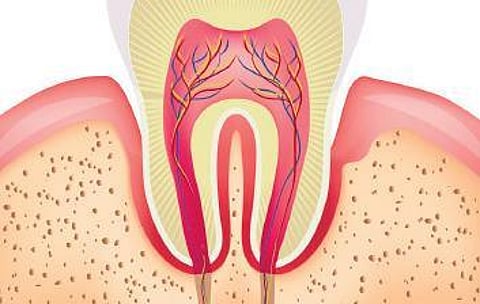

KOCHI: For most people, teeth sensitivity is a major dental problem. It may sometimes spoil their entire day. To spread awareness about the issue, March 31 is observed as World Teeth Sensitivity Awareness Day
Teeth sensitivity can be caused by many conditions.
Healthy teeth have a layer of enamel that protects their crown, which is the part above the gum line. Under the gum line, a layer called cementum protects the tooth root. Underneath the enamel and cementum lie dentin, which is less dense and contains microscopic tubules.
When dentin loses its protective enamel or cementum covering, these tubules allow heat and cold or acidic or sticky foods to reach the nerves and cells inside the tooth. Dentin may also be exposed when gums recede or move away from their usual position.
Sensitive teeth can be treated. The type of treatment will depend on what is causing the sensitivity. Your dentist may suggest one of these treatments: Desensitizing toothpaste: This contains compounds that help block the transmission of sensation from the tooth surface to the nerve, and usually requires several applications before the sensitivity is reduced.
Fluoride gel: An in-office technique that strengthens tooth enamel and reduces the transmission of sensations. A crown or a filling: These may be used to correct a flaw or decay that causes sensitivity. Surgical gum coverage using soft tissue grafting: If gum tissue has been lost from the root, this will protect the root and reduce sensitivity.
Root canal treatment: If sensitivity is severe and persistent and cannot be treated by other means, your dentist may recommend this treatment to eliminate the problem. The author is a consultant periodontist at Government Urban Dental Clinic, Thiruvananthapuram
Oral hygiene
Proper oral hygiene is the key to preventing sensitivity. Changing your brushing technique from horizontal to gentle angular sweeping motion in up and down directions will be ideal. Always use a cream type toothpaste and a soft-bristle flexible toothbrush. Refrain from using toothpicks and practice using water flosser devices, interdental brushes or flosses to remove the lodged food debris. With these simple tips, you can keep teeth sensitivity at bay.
Causes of sensitivity
Floride solution
Fluoride prevents sensitivity and dental decay by remineralising the tooth enamel when applied topically to the teeth. Drinking tap water, as well as toothpaste and mouthwash, may provide you with a small quantity of fluoride. An additional dose may be taken after inspection and cleaning.